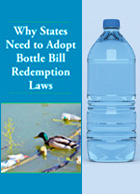States Need to Adopt Bottle Bills: Press Release
States that have adopted bottle bill laws have a higher rate of return for empty beverage containers than states that have not adopted them. Most beverage bottles today are plastic, and Americans are using about 425 beverage containers per person per year. For plastic water bottles, only 30% get recycled and 70% end up in landfills, oceans, as litter, or get incinerated. In general, states with bottle bill redemption laws have a 75% to 80% return rate on redeemable containers. Studies show that beverage container legislation has reduced total roadside litter by between 30% and 64% in states that have bottle bills. There are presently 10 states with bottle bills. They are: California, Connecticut, Hawaii, Iowa, Maine, Massachusetts, Michigan, New York, Oregon, and Vermont. That leaves 40 states that need to adopt them. The bottle redemption bills work by adding a fee attached to certain beverages at time of purchase, and then the fee is returned when the empty bottles are returned. The amount of deposit fee varies from state to state. David Brown, Sc.D. EHHI's toxicologist explained, "Putting the higher deposit fee of 10-cent results in a higher rate of return than the 5-cent deposit fee. Michigan and Oregon have a 10- cent fee and they get a return rate over 80%. This means that the vast majority of beverage containers being sold are making their-way back and are being removed from the state's waste stream." Bottle bills programs create monetary incentives that reduce the amount plastic and waste that is created by beverage containers. Research indicates that bottle bills create a reduction of beverage bottle litter by 73%. "Getting plastic beverage bottles out of the waste stream is critically important," said Gaboury Benoit, Ph.D., Professor of Environmental Chemistry at Yale's School of the Environment. "These plastic bottles, if not redeemed, break down into microplastics, that are tiny bits of plastic smaller than a grain of rice, and sometimes even much smaller than that. There is probably no other contaminant as abundant as microplastics or one so widely distributed in the global environment," Benoit continued. Many states that do not have bottle bills claim they are promoting recycling instead. However, recycling rates are very low, and can be as low as 25% and sometimes as low as 10%, where it is in Tennessee. "If states are to reduce plastic, glass and metal in their waste streams, then enacting bottle bill redemption laws are critical to making this happen,” said EHHI Board member Barbara Miller, J.D. For all the reasons stated above, EHHI is asking the 40 states that do not have bottle redemption bill laws to think about adopting them. An added benefit to municipalities in states might be the reduced cost of hauling the state's trash to landfills, as the waste streams will be reduced by enacting the bottle bill. 
